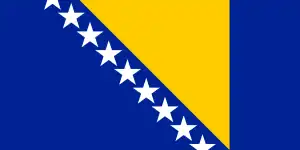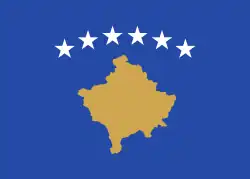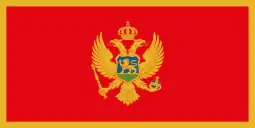| Founded | 1923 |
|---|---|
| Abolished | 1992 |
| Region | Yugoslavia |
| Last champions | Partizan (6) |
| Most successful club(s) | Red Star Belgrade (12) |
The Yugoslav Cup (Croatian: Pokal Jugoslavije; Serbian: Куп Југославије; Slovene: Pokal Jugoslavije, Macedonian: Куп на Југославија), officially known between 1923 and 1940 as the King Alexander Cup (Serbian: Куп краља Александра; Croatian: Kup kralja Aleksandra,[1] and between 1947 and 1991 as the Marshal Tito Cup (Serbian: Куп маршала Тита; Croatian: Kup maršala Tita; Slovene: Pokal maršala Tita; Macedonian: Куп на маршал Тито), was one of two major football competitions in Yugoslavia, the other one being the Yugoslav League Championship. The Yugoslav Cup took place after the league championships when every competitive league in Yugoslavia had finished, in order to determine which teams are ranked as their corresponding seeds. The Marshal Tito Cup trophy was based on a design by Branko Šotra.
Kingdom of Yugoslavia (1923–1940)
The pre-WW II competition in the then Kingdom of Slovenes, Croats and Serbs (renamed Kingdom of Yugoslavia at the end of 1929) was held irregularly, and sometimes involved only regional selections, sometimes only clubs, and occasionally both clubs and regions. Between 1924 and 1927 the competition consisted of squads from the regional subassociations.[2] Only the players with citizenship of the Kingdom of Serbs, Croats and Slovenes were eligible.[1]
List of winners
| Season | Winner | Score | Runners–up |
|---|---|---|---|
| 1923 | HAŠK Zagreb | 2–0 | Concordia Zagreb |
| 1924 | Zagreb XI | 3–2 | Split XI |
| 1925 | Zagreb XI | 3–1 | Split XI |
| 1926 | Zagreb XI | 3–1 | Belgrade XI |
| 1927 | Belgrade XI | 3–0 | Subotica XI |
| 1928 | unknown | ||
| 1930 | unknown | ||
| 1931 | SAND Subotica | 2–2, 2–1 | SAŠK Sarajevo |
| 1934 | BSK Belgrade | league | Hajduk Split |
| 1936 | SK Jugoslavija | 1–2, 4–0 | Građanski Zagreb |
| 1938 | Građanski Zagreb | 4–1, 2–2 | BSK Belgrade |
| 1939 | SK Jugoslavija | 5–1, 0–0 | Slavija Sarajevo |
| 1940 | unknown | ||
| 1941 | BSK Belgrade | Serb region only | |
The winners of the 1928 and 1930 editions are unknown. Split XI, losing finalists in 1924 and 1925, was composed of Hajduk Split players only. After their third successive win in 1926, Zagreb obtained the golden cup of King Aleksandar to keep.
SFR Yugoslavia (1947–92)
Competition format
The competition format was an elimination championship where every competitive team was offered a chance to enter. Beginning in the lowest tiers of teams, the competition followed a one-game elimination format. Higher-tier teams got berths in the second round, third round, and so on. The First League (Prva Liga) teams always began in the 1/16 finals, and the rest of the 16 berths being filled by lower-tier teams who managed to make it to the round of 32.
Once the round of 16 was reached, the format would be changed to a two-game elimination format, being played at home and away for each team. At this point it became a First League ordeal, as the smaller teams had zero chance against the titans of Yugoslavian football. Historically, the finals were usually reached only by the better-performing First League teams (Partizan, Hajduk, Red Star, Dinamo, etc.).
Key
| (R) | Replay |
| Two-legged tie | |
| * | Match went to extra time |
| † | Match decided by a penalty shoot-out after extra time |
| ‡ | Winning team won The Double |
| Italics | Team from outside the top level of Yugoslav football |
List of winners
- No participation of Croatian and Slovenian clubs. The only Macedonian club dropped out of competition in Round of 16. The last Bosnian club left the competition in May 1992 in Semi finals stage.
Results by team
Teams shown in italics are no longer in existence.
| Club | Republic/Province | Winners | Last final won | Runners-up | Last final lost | Total apps |
|---|---|---|---|---|---|---|
| Red Star Belgrade | Serbia | 12 | 1990 | 8 | 1992 | 20 |
| Hajduk Split | Croatia | 9 | 1991 | 5 | 1990 | 14 |
| Dinamo Zagreb | Croatia | 7 | 1983 | 8 | 1986 | 15 |
| Partizan | Serbia | 6 | 1992 | 4 | 1979 | 10 |
| OFK Belgrade | Serbia | 4 | 1966 | – | – | 4 |
| Velež | Bosnia and Herzegovina | 2 | 1986 | 2 | 1989 | 4 |
| Rijeka | Croatia | 2 | 1979 | 1 | 1987 | 3 |
| Borac Banja Luka | Bosnia and Herzegovina | 1 | 1988 | 1 | 1974 | 2 |
| Vardar | Macedonia | 1 | 1961 | – | – | 1 |
| Sarajevo | Bosnia and Herzegovina | – | – | 2 | 1983 | 2 |
| Budućnost Titograd | Montenegro | – | – | 2 | 1977 | 2 |
| Naša Krila Zemun | Serbia | – | – | 2 | 1949 | 2 |
| Željezničar | Bosnia and Herzegovina | – | – | 1 | 1981 | 1 |
| Trepča | Kosovo | – | – | 1 | 1978 | 1 |
| Sloboda Tuzla | Bosnia and Herzegovina | – | – | 1 | 1971 | 1 |
| Olimpija Ljubljana | Slovenia | – | – | 1 | 1970 | 1 |
| Bor | Serbia | – | – | 1 | 1968 | 1 |
| Spartak Subotica | Vojvodina | – | – | 1 | 1962 | 1 |
| Varteks | Croatia | – | – | 1 | 1961 | 1 |
| Radnički Belgrade | Serbia | – | – | 1 | 1957 | 1 |
| Vojvodina | Vojvodina | – | – | 1 | 1951 | 1 |
Performance by Republic/Province
| Republic | Winner | Runner-Up | Appearances |
|---|---|---|---|
| SR Bosnia and Herzegovina | 3 | 7 | 10 |
| SR Croatia | 18 | 15 | 33 |
| SAP Kosovo | – | 1 | 1 |
| SR Macedonia | 1 | – | 1 |
| SR Montenegro | – | 2 | 2 |
| SR Slovenia | – | 1 | 1 |
| SR Serbia | 22 | 16 | 38 |
| SAP Vojvodina | – | 2 | 2 |
Successor cups
 Bosnia and Herzegovina → Bosnia and Herzegovina Football Cup (1994–present)
Bosnia and Herzegovina → Bosnia and Herzegovina Football Cup (1994–present) Croatia → Croatian Football Cup (1992–present)
Croatia → Croatian Football Cup (1992–present) Kosovo → Kosovar Cup (1991–present)
Kosovo → Kosovar Cup (1991–present) North Macedonia → Macedonian Football Cup (1992–present)
North Macedonia → Macedonian Football Cup (1992–present) Montenegro → Montenegrin Cup (2006–present; from 1992 to 2006 had a joint cup with Serbia)
Montenegro → Montenegrin Cup (2006–present; from 1992 to 2006 had a joint cup with Serbia) Serbia → Serbian Cup (2006–present, from 1992 to 2006 had a joint cup with Montenegro)
Serbia → Serbian Cup (2006–present, from 1992 to 2006 had a joint cup with Montenegro) Slovenia → Slovenian Football Cup (1991–present)
Slovenia → Slovenian Football Cup (1991–present)
Sources
See also
References
- 1 2 Yugoslavia/Serbia and Montenegro – Cup Finals at RSSSF
- ↑ Fudbal u Kraljevini Jugoslaviji, Milorad Sijić, pag. 30